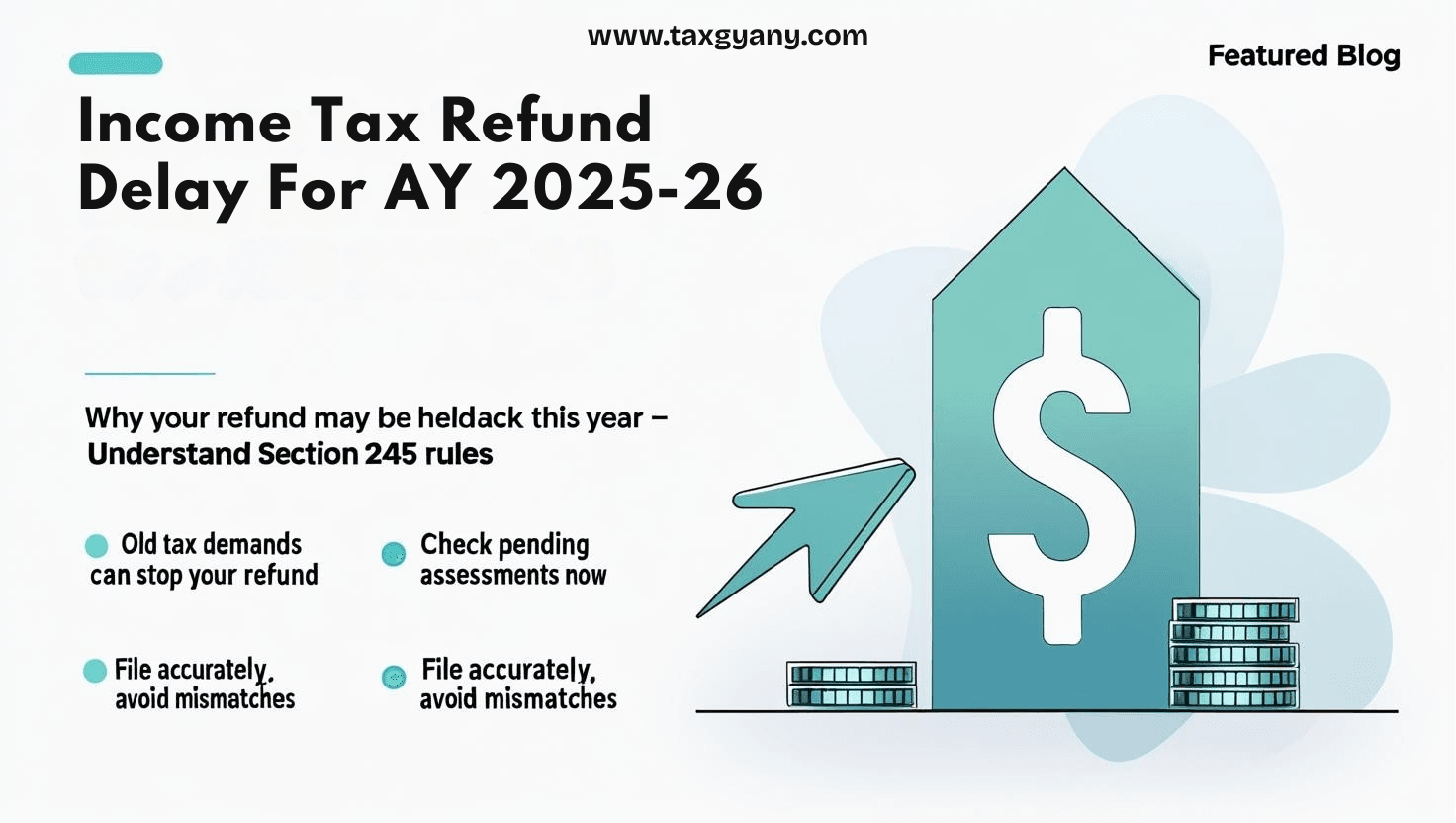Income Tax Refund Delay for AY 2025–26: Why Your Tax Refund May Be Held Back This Year
The Income Tax Department of India has begun processing returns for Assessment Year (AY) 2025–26 with over 1.05 crore Income Tax Returns (ITRs) already filed as of early July 2025. Around 95% of these ITRs have been verified, and about 63 lakh have been processed. However, many taxpayers are reporting income tax refund delays this year.
Tax experts say the problem lies in stricter assessment processes, pending older assessments, and technical glitches in the system. Let’s look at why your refund might be delayed in AY 2025–26 and what new rules you need to know.
✅ Why Are Refunds Getting Delayed in AY 2025–26?
Refund delays are not new, but this year they appear to be more widespread. Reports suggest the tax department is applying additional scrutiny during processing. In many cases, refunds are not being issued if previous-year assessments are not completed or if there are outstanding demands.
This is being done under Section 245 of the Income Tax Act, which gives the department the right to adjust any old tax dues against current refunds.
✅ What Is Section 245?
Section 245 of the Income Tax Act empowers the income tax department to check if you owe any tax dues from previous years before releasing your refund. If you do, they can adjust your refund against those pending dues.
While this is not a new provision, experts warn it is being used more aggressively this year.
“Section 245 would likely apply to specific taxpayers — such as those under scrutiny, with past mismatches, pending tax demands, or incomplete assessments — with the goal of stopping refund claims where likely tax demands are expected.”
In other words, the department wants to ensure no unpaid taxes slip through when issuing refunds. But the concern is that this is being applied too broadly.
✅ Impact on Honest Taxpayers
Tax professionals warn this approach risks punishing honest taxpayers who file on time and accurately.
“Taxpayers who file returns timely, report all income, and respond to notices may find their refunds delayed because of administrative inefficiencies.”
For example, even if you have no outstanding tax notices, your refund may be held up if the system flags your return for verification.
This can feel unfair to taxpayers who comply with all rules but still face weeks or months of delay.
✅ Why Is This Happening?
Several reasons are behind the stricter approach:
- Pending old assessments: Refunds are not released if your past assessments are incomplete.
- Outstanding demands: Even small, disputed amounts from previous years can trigger holds under Section 245.
- Technical errors: The faceless assessment scheme and AI-based systems like Project Insight are still evolving.
- False positives: New tools like AIS (Annual Information Statement) and TIS (Taxpayer Information Summary) often have mismatches that wrongly flag returns.
“New reporting tools often have mismatches that flag even small refund cases for review. Resolution requires manual intervention, delaying refunds further.”
✅ Role of Technology – Help or Hindrance?
The Income Tax Department has invested in AI and faceless assessments to improve efficiency. However, experts say these tools are still immature.
For example:
- AIS and TIS can have incorrect or outdated data.
- AI systems may not always distinguish between genuine salaried taxpayers and suspicious claims.
- Many refund cases get incorrectly flagged and require human override.
This results in even small, low-risk refunds being delayed for manual review.
✅ Suggestions by Tax Experts
Tax professionals have called for smarter, more transparent processes:
- Identify low-risk taxpayers and issue their refunds quickly.
- Improve communication so taxpayers know why their refund is delayed.
- Deploy extra staff to clear pending assessments.
- Enhance AI systems to reduce false positives.
- Allow partial refunds — hold only the disputed portion, not the entire refund.
✅ Why This Matters
Refunds are not a gift from the government. They are the taxpayer’s right. When taxpayers pay taxes honestly and on time, they expect their refunds to be processed promptly.
“A trustworthy and transparent tax administration is the cornerstone of a compliant society.”
If honest taxpayers face delays, they may lose faith in the system and feel less motivated to be timely and accurate in future filings.
✅ Final Thoughts
The Income Tax Department’s goal of plugging revenue leakages is understandable. But it must balance this with fairness to honest taxpayers.
If you are filing your ITR for AY 2025–26, here’s what you can do:
- Check your AIS/TIS for errors before filing.
- Clear any old tax dues.
- Respond quickly to notices.
- Stay updated on processing status via the income tax portal.
The government must also ensure that Section 245 is applied carefully and only to taxpayers with genuine outstanding issues.

